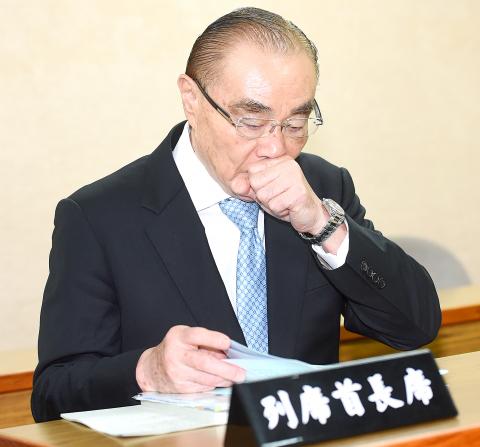The military is capable of defending against “decapitation strike” strategies aimed at the nation, Minister of National Defense Feng Shih-kuan (馮世寬) said at a meeting of the legislature’s Foreign and National Defense Committee yesterday.
Responding to questions from Democratic Progressive Party (DPP) Legislator Wang Ding-yu (王定宇), Office for Operations and Planning Director Lieutenant General Chiang Chen-chung (姜振中) said that the nation had a dedicated military unit to defend Taipei.
The Marines 66th Brigade, based in New Taipei City’s Linkou Township (林口), was established in 2005 and is responsible for defending Taipei against decapitation strikes.

Photo: Chu Pei-hsiung, Taipei Times
In April, the brigade moved one infantry battalion to Fuxinggang (復興崗) in Taipei’s Beitou District (北投) to improve its response time.
In July, a drill simulating a political-military strike against Taiwan seeking to overthrow its leadership was conducted, Chiang said, adding that the 66th Brigade has maintained its original structure and training.
Furthering the capabilities of the unit has been given priority in past years, Chiang said.
When asked if Taiwan has any units capable of launching decapitation strikes equivalent to the various US special forces units, such as the navy SEALs, the 101st Airborne Division and the 75th Ranger Regiment, Chiang said: “[We] have special forces.”
Asked if Taiwan had any plans for the implementation of decapitation strikes, Chiang said the military holds annual exercises and Wang would be welcome to attend a briefing.
The military has the capability and units to launch a decapitation strike against an enemy, Feng added.
Feng also told lawmakers that China had not reacted to Premier William Lai’s (賴清德) comments on Taiwanese independence.
Lai, at a Sept. 27 legislative meeting, said that his personal stance on Taiwanese independence had not wavered, making him the first premier to have made such comments during a legislative session.
When asked by Chinese Nationalist Party (KMT) Legislator Jason Hsu (許毓仁) yesterday whether he agreed with Lai’s comments, Feng said that he did not wish to comment on the actions or words of a higher-ranking official, adding that Lai and his Cabinet had expressed that the economy should be their primary focus.
Hsu asked whether Feng knew of Chinese plans for a 2020 attack on the nation, which some media outlets have speculated about.
Feng denied knowledge of such matters and said it was a misuse of information.
In response to KMT Legislator Johnny Chiang’s (江啟臣) question on what role Taiwan would play in the event of a US-North Korea war, Feng said that Taiwan held an important geographic position and should strive to preserve cross-strait peace.
Additional reporting by CNA

Alain Robert, known as the "French Spider-Man," praised Alex Honnold as exceptionally well-prepared after the US climber completed a free solo ascent of Taipei 101 yesterday. Robert said Honnold's ascent of the 508m-tall skyscraper in just more than one-and-a-half hours without using safety ropes or equipment was a remarkable achievement. "This is my life," he said in an interview conducted in French, adding that he liked the feeling of being "on the edge of danger." The 63-year-old Frenchman climbed Taipei 101 using ropes in December 2004, taking about four hours to reach the top. On a one-to-10 scale of difficulty, Robert said Taipei 101

Nipah virus infection is to be officially listed as a category 5 notifiable infectious disease in Taiwan in March, while clinical treatment guidelines are being formulated, the Centers for Disease Control (CDC) said yesterday. With Nipah infections being reported in other countries and considering its relatively high fatality rate, the centers on Jan. 16 announced that it would be listed as a notifiable infectious disease to bolster the nation’s systematic early warning system and increase public awareness, the CDC said. Bangladesh reported four fatal cases last year in separate districts, with three linked to raw date palm sap consumption, CDC Epidemic Intelligence

US climber Alex Honnold left Taiwan this morning a day after completing a free-solo ascent of Taipei 101, a feat that drew cheers from onlookers and gained widespread international attention. Honnold yesterday scaled the 101-story skyscraper without a rope or safety harness. The climb — the highest urban free-solo ascent ever attempted — took just more than 90 minutes and was streamed live on Netflix. It was covered by major international news outlets including CNN, the New York Times, the Guardian and the Wall Street Journal. As Honnold prepared to leave Taiwan today, he attracted a crowd when he and his wife, Sanni,

Two Taiwanese prosecutors were questioned by Chinese security personnel at their hotel during a trip to China’s Henan Province this month, the Mainland Affairs Council (MAC) said yesterday. The officers had personal information on the prosecutors, including “when they were assigned to their posts, their work locations and job titles,” MAC Deputy Minister and spokesman Liang Wen-chieh (梁文傑) said. On top of asking about their agencies and positions, the officers also questioned the prosecutors about the Cross-Strait Joint Crime-Fighting and Judicial Mutual Assistance Agreement, a pact that serves as the framework for Taiwan-China cooperation on combating crime and providing judicial assistance, Liang